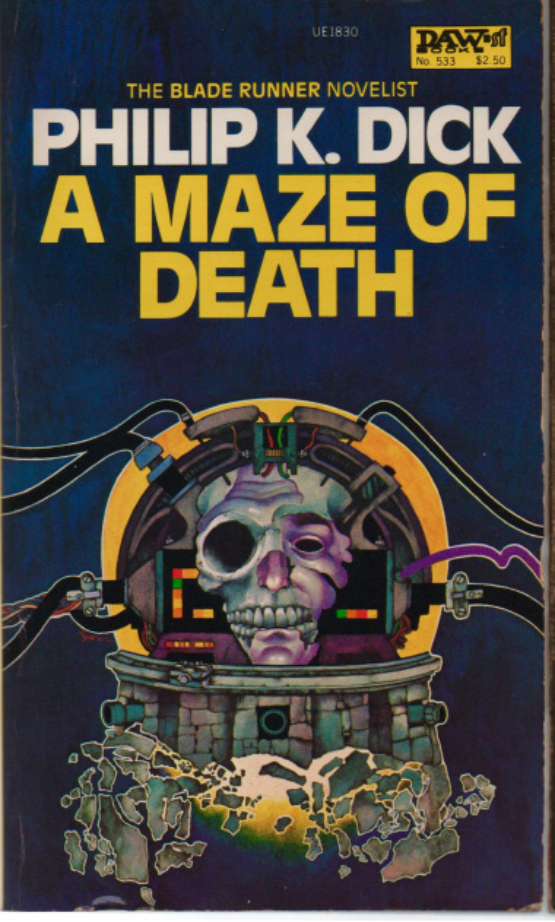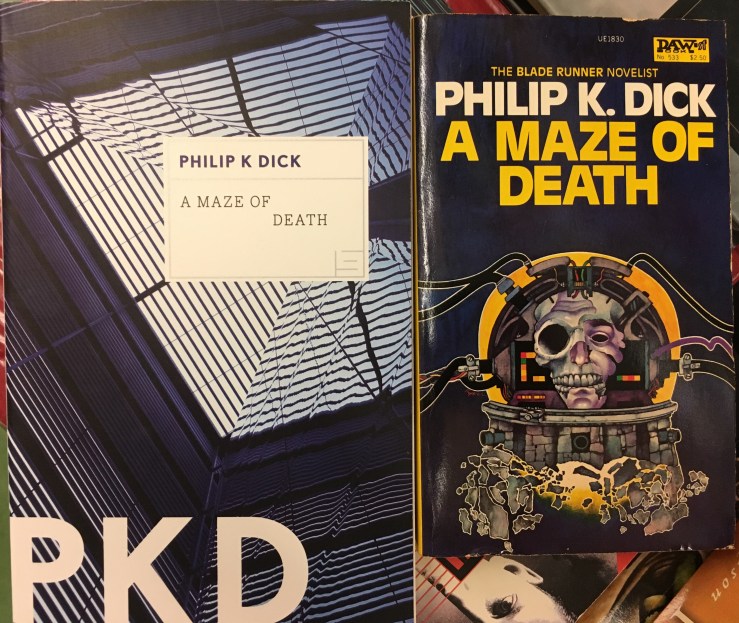“Roog”
by
Philip K. Dick
“Roog!” the dog said. He rested his paws on the top of the fence and looked around him.
The Roog came running into the yard.
It was early morning, and the sun had not really come up yet. The air was cold and gray, and the walls of the house were damp with moisture. The dog opened his jaws a little as he watched, his big black paws clutching the wood of the fence.
The Roog stood by the open gate, looking into the yard. He was a small Roog, thin and white, on wobbly legs. The Roog blinked at the dog, and the dog showed his teeth.
“Roog!” he said again. The sound echoed into the silent half darkness. Nothing moved nor stirred. The dog dropped down and walked back across the yard to the porch steps. He sat down on the bottom step and watched the Roog. The Roog glanced at him. Then he stretched his neck up to the window of the house, just above him. He sniffed at the window.
The dog came flashing across the yard. He hit the fence, and the gate shuddered and groaned. The Roog was walking quickly up the path, hurrying with funny little steps, mincing along. The dog lay down against the slats of the gate, breathing heavily, his red tongue hanging. He watched the Roog disappear.
The dog lay silently, his eyes bright and black. The day was beginning to come. The sky turned a little whiter, and from all around the sounds of people echoed through the morning air. Lights popped on behind shades. In the chilly dawn a window was opened.
The dog did not move. He watched the path.
In the kitchen Mrs. Cardossi poured water into the coffee pot. Steam rose from the water, blinding her. She set the pot down on the edge of the stove and went into the pantry. When she came back Alf was standing at the door of the kitchen. He put his glasses on.
“You bring the paper?” he said.
“It’s outside.”
Alf Cardossi walked across the kitchen. He threw the bolt on the back door and stepped out onto the porch. He looked into the gray, damp morning. At the fence Boris lay, black and furry, his tongue out.
“Put the tongue in,” Alf said. The dog looked quickly up. His tail beat against the ground. “The tongue,” Alf said. “Put the tongue in.”
The dog and the man looked at one another. The dog whined. His eyes were bright and feverish.
“Roog!” he said softly.
“What?” Alf looked around. “Someone coming? The paperboy come?”
The dog stared at him, his mouth open.
“You certainly upset these days,” Alf said. “You better take it easy. We both getting too old for excitement.”
He went inside the house.
The sun came up. The street became bright and alive with color. The postman went along the sidewalk with his letters and magazines. Some children hurried by, laughing and talking.
About 11:00, Mrs. Cardossi swept the front porch. She sniffed the air, pausing for a moment.
“It smells good today,” she said. “That means it’s going to be warm.” In the heat of the noonday sun the black dog lay stretched out full length, under the porch. His chest rose and fell. In the cherry tree the birds were playing, squawking and chattering to each other. Once in a while Boris raised his head and looked at them. Presently he got to his feet and trotted down under the tree.
He was standing under the tree when he saw the two Roogs sitting on the fence, watching him.
“He’s big,” the first Roog said. “Most Guardians aren’t as big as this.”
The other Roog nodded, his head wobbling on his neck. Boris watched them without moving, his body stiff and hard. The Roogs were silent, now, looking at the big dog with his shaggy ruff of white around his neck.
“How is the offering urn?” the first Roog said. “Is it almost full?”
“Yes.” The other nodded. “Almost ready.”
“You, there!” the first Roog said, raising his voice. “Do you hear me? We’ve decided to accept the offering, this time. So you remember to let us in. No nonsense, now.”
“Don’t forget,” the other added. “It won’t be long.”
Boris said nothing.
The two Roogs leaped off the fence and went over together just beyond the walk. One of them brought out a map and they studied it.
“This area really is none too good for a first trial,” the first Roog said. “Too many Guardians… Now, the northside area—”
“They decided,” the other Roog said. “There are so many factors—”
“Of course.” They glanced at Boris and moved back farther from the fence. He could not hear the rest of what they were saying.
Presently the Roogs put their map away and went off down the path.
Boris walked over to the fence and sniffed at the boards. He smelled the sickly, rotten odor of Roogs and the hair stood up on his back.
That night when Alf Cardossi came home the dog was standing at the gate, looking up the walk. Alf opened the gate and went into the yard.
“How are you?” he said, thumping the dog’s side. “You stopped worrying? Seems like you been nervous of late. You didn’t used to be that way.”
Boris whined, looking intently up into the man’s face.
“You a good dog, Boris,” Alf said. “You pretty big, too, for a dog. You don’t remember long ago how you used to be only a little bit of a puppy.”
Boris leaned against the man’s leg.
“You a good dog,” Alf murmured. “I sure wish I knew what is on your mind.”
He went inside the house. Mrs. Cardossi was setting the table for dinner. Alf went into the living room and took his coat and hat off. He set his lunch pail down on the sideboard and came back into the kitchen.
“What’s the matter?” Mrs. Cardossi said.
“That dog got to stop making all that noise, barking. The neighbors going to complain to the police again.”
“I hope we don’t have to give him to your brother,” Mrs. Cardossi said, folding her arms. “But he sure goes crazy, especially on Friday morning, when the garbage men come.”
“Maybe he’ll calm down,” Alf said. He lit his pipe and smoked solemnly. “He didn’t used to be that way. Maybe he’ll get better, like he was.”
“We’ll see,” Mrs. Cardossi said.
The sun rose up, cold and ominous. Mist hung over all the trees and in the low places.
It was Friday morning.
The black dog lay under the porch, listening, his eyes wide and staring. His coat was stiff with hoarfrost and the breath from his nostrils made clouds of steam in the thin air. Suddenly he turned his head and leaped up.
From far off, a long way away, a faint sound came, a kind of crashing sound.
“Roog!” Boris cried, looking around. He hurried to the gate and stood up, his paws on top of the fence.
In the distance the sound came again, louder now, not as far away as before. It was a crashing, clanging sound, as if something were being rolled back, as if a great door were being opened
“Roog!” Boris cried. He stared up anxiously at the darkened windows above him. Nothing stirred, nothing.
And along the street the Roogs came. The Roogs and their truck moved along bouncing against the rough stones, crashing and whirring.
“Roog!” Boris cried, and he leaped, his eyes blazing. Then he became more calm. He settled himself down on the ground and waited, listening.
Out in front the Roogs stopped their truck. He could hear them opening the doors stepping down onto the sidewalk. Boris ran around in a little circle. He whined and his muzzle turned once again toward the house.
Inside the warm, dark bedroom, Mr. Cardossi sat up a little in bed and squinted at the clock.
“That damn dog,” he muttered. “That damn dog.” He turned his face toward the pillow and closed his eyes.
The Roogs were coming down the path, now. The first Roog pushed against the gate and the gate opened. The Roogs came into the yard. The dog backed away from them.
“Roog! Roog!” he cried. The horrid, bitter smell of Roogs came to his nose, and he turned away.
“The offering urn,” the first Roog said. “It is full, I think.” He smiled at the rigid, angry dog. “How very good of you,” he said
The Roogs came toward the metal can, and one of them took the lid from it.
“Roog! Roog!” Boris cried, huddled against the bottom of the porch steps. His body shook with horror. The Roogs were lifting up the big metal can, turning it on its side. The contents poured out onto the ground, and the Roogs scooped the sacks of bulging, splitting paper together, catching at the orange peels and fragments, the bits of toast and egg shells.
One of the Roogs popped an egg shell into his mouth. His teeth crunched the egg shell.
“Roog!” Boris cried hopelessly, almost to himself. The Roogs were almost finished with their work of gathering up the offering. They stopped for a moment, looking at Boris.
Then, slowly, silently, the Roogs looked up, up the side of the house, along the stucco, to the window, with its brown shade pulled tightly down.
“ROOG!” Boris screamed, and he came toward them, dancing with fury and dismay. Reluctantly, the Roogs turned away from the window. They went out through the gate, closing it behind them.
“Look at him,” the last Roog said with contempt, pulling his corner of the blanket up on his shoulder. Boris strained against the fence, his mouth open, snapping wddly. The biggest Roog began to wave his arms furiously and Boris retreated. He settled down at the bottom of the porch steps, his mouth still open, and from the depths of him an unhappy, terrible moan issued forth, a wail of misery and despair.
“Come on,” the other Roog said to the lingering Roog at the fence.
They walked up the path.
“Well, except for these little places around the Guardians, this area is well cleared,” the biggest Roog said. “I’ll be glad when this particular Guardian is done. He certainly causes us a lot of trouble.”
“Don’t be impatient,” one of the Roogs said. He grinned. “Our truck is full enough as it is. Let’s leave something for next week.”
All the Roogs laughed.
They went on up the path, carrying the offering in the dirty, sagging blanket.









